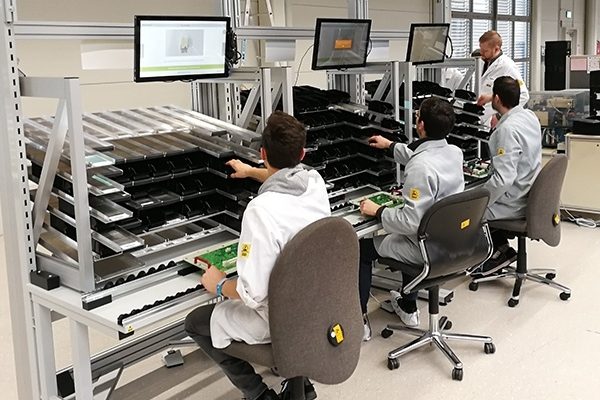Bad Driburg/Lemgo Not least because of the increasing shortage of skilled workers in Germany, the employment of (severely) disabled people has become more of a focus in recent years. Overall, there is a need to exploit all potential in the long term in order to secure growth, prosperity and cohesion. However, in order to sustainably increase individual job satisfaction, people with disabilities must be enabled to earn their own living in a secure job – depending on their own abilities and interests. If employers actively shape occupational inclusion at this point, people with disabilities can potentially be fully capable employees, who in many cases are particularly motivated to fulfil their tasks.
Objectives of the project
- Design, implementation and evaluation of an assembly assistance system for the integration and cooperation of people with disabilities
- Increasing job satisfaction through individually tailored work content, more complex work steps and more self-sufficient work processes
- Increased productivity through easier planning and constant cycles
- Increase in quality through continuous training, assisted production steps, automatic checking of work processes
Innovation
The itsowl-TT-FlexInt project with INTEG Integrationsbetrieb für Behinderte GmbH addresses the problem described above and is based on an intelligent, networked assistance system that offers the possibility of further integrating employees with different physical and mental limitations into the production process by flexibly adapting the work steps to be performed.
The main focus of the developed solution was, in addition to increased job satisfaction through more complex work content, in particular on the extensive integration of all employees into normal production processes in order to enable an almost constant cycle. The assistance system also enables the gradual learning and practice of assembly processes, so that continuous support is possible from the less efficient learning phase to the more efficient routine phase.
In order to be able to respond to the individual needs of the employees involved, three assembly units were coordinated in the project. The workstations can be individually configured by a central control unit, which enables a manager (e.g. group leader) to set up and assign the individual assembly units. A first set-up took place in the SmartFactoryOWL and was presented to employees. Both workers’ and managers’ needs were integrated into the workplace and developed, tested and handed over in the SmartFactoryOWL Living Lab together with INTEG.
Through the results and insights gained, the transfer project can show many companies a starting point for consciously dealing with diversity in the age of Work 4.0 and represent a model project for the flexible adaptation of working conditions in production. The potential of people with disabilities in particular can thus be clarified and the commitment of the business community to inclusion can potentially be strengthened.
Participating partners:
inIT, Hochschule Ostwestfalen-Lippe, Campusallee 6, 32657 Lemgo, Germany
Fraunhofer IOSB-INA, Institutsteil für industrielle Automation, Campusallee 1, 32657 Lemgo, Germany
INTEG Integrationsbetrieb für Behinderte, Groppendiek 2, 33014 Bad Driburg, Germany




